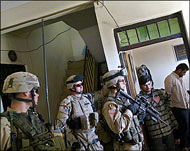World Bank board approves Wolfowitz
The World Bank’s board has approved the nomination of US Deputy Defence Secretary Paul Wolfowitz, an architect of the Iraq war, to be the next president of the 184-nation development bank.

President George Bush in March surprised the international community by recommending Wolfowitz for the job.
Wolfowitz’s hardline foreign policy stance has made him a target of critics at home and abroad.
Wolfowitz, 61, will take the helm of the development bank on 1 June.
The bank’s stated mission is to fight poverty and improve the living standards of people in developing countries. It lends about $20 billion a year to developing countries for projects, including roads, schools and fighting Aids.
The US is the bank’s largest shareholder. The bank traditionally has had an American president and its sister institution, the International Monetary Fund, is headed by a European.
Unanimous choice
The vote by the bank’s 24-member board on Thursday was unanimous.
Since his 16 March nomination by Bush, Wolfowitz, seeking to quell criticism over his selection, has reached out. He has telephoned Bono, the Irish rock star who is an advocate for helping the world’s poor.
 |
|
Wolfowitz is considered to be the |
He has met with many countries’ representatives to the World Bank and made a trip to Europe, where he won the endorsement of European Union governments.
Support from Europe was important because hostility there still lingers over the US-led war in Iraq.
Bush’s choice of Wolfowitz has raised the hackles of some international aid agencies and other groups. They question his development credentials and worry that he would use the development bank to help Washington’s friends and punish its enemies.
Some of those critics showed up on a gray morning to protest against the choice of Wolfowitz outside the World Bank’s headquarters on Thursday.
Pentagon experience
Wolfowitz has sought to counter those concerns. He has said that poverty reduction and economic development were the bank’s core businesses and that he would not pursue any political agenda.
 |
|
The World Bank and IMF remain |
“I really believe the mission of the bank,” Wolfowitz had told The Associated Press in a 16 March interview.
“I think one of the challenges of the institution, and therefore, for me, is how to make sure it makes the best use of the considerable resource at its disposal, which are both financial and human.”
While critics question his development credentials, Wolfowitz has said his management experience at the Pentagon and his diplomatic experience at the State Department prepared him for the job. At State, he was assistant secretary for East Asia and US ambassador to Indonesia.
Wolfowitz has been criticised in Congress for underestimating the number of US troops needed in Iraq and for understating the number of troops killed in Iraq during testimony to a House panel.
Wolfensohn’s legacy
Wolfowitz was also criticised for predicting before the invasion that Iraqi oil would generate $50 billion to $100 billion over two to three years, limiting US war costs. Instead, Iraq generated just $17 billion in oil revenues in the first 19 months after the invasion.
|
“I think one of the challenges of the institution, and therefore for me, is how to make sure it makes the best use of the considerable resource at its disposal” Paul Wolfowitz, |
The installation of Wolfowitz allows the Bush administration to put its imprint on the development bank, which employs 10,000 people worldwide.
James Wolfensohn, the current president, will step down at the end of May, when his second five-year term concludes.
Wolfensohn helped engineer a number of changes in the bank’s philosophy and the way it operates. He pushed to put greater emphasis on “home-grown” development planning, trying to move the bank closer to the countries it seeks to help.
He pushed for debt relief for the world’s poorest countries. His 1996 “cancer of corruption” speech focused a new light on corruption as an impediment to development that must be addressed.